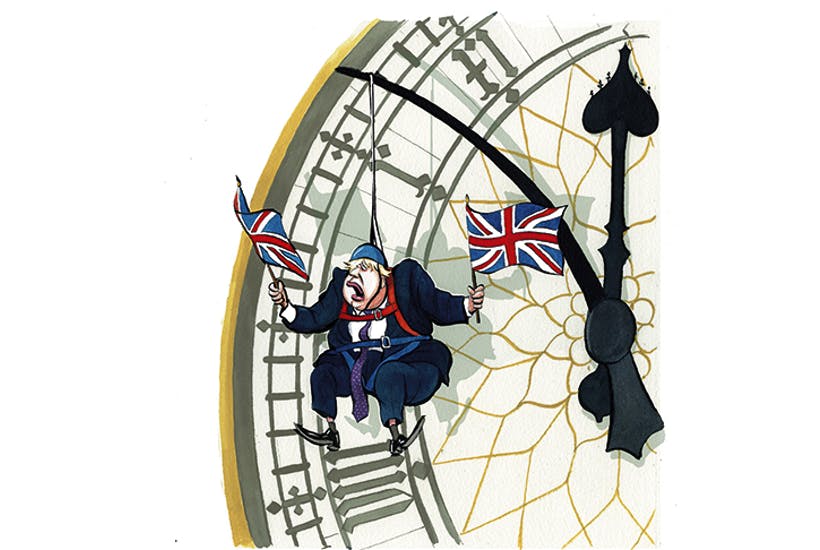So what is going to happen? There appear to be grounds for quiet confidence about the result. Almost all the polls are showing the same outcome: a twelve-point Tory lead. The data suggests that most voters have made up their minds about Jeremy Corbyn and Boris Johnson and that is not good news for Corbyn.
Equally, there is a lot of evidence from previous elections that the campaign itself has little effect on polling day. That was not the case in 1992, while 2010 and 2015 require more analysis.
But I believe that it was true in 1979, 1983, 1987, 1997, 2001 and 2005. Yet all those examples are inevitably overshadowed by 2017, probably the most transformative election campaign in the whole of political history and – for Tories – nearly as traumatic as 1945.
That is why almost all Tories are nervous today. Two-and-a-half weeks really is a long time in politics, leaving plenty of scope for gaffes and 2017 casts a long shadow. Everyone remembers what happened back then. It was not so much an election campaign as an electoral haemorrhage, as strong and stable bled away to weak and wobbly, while a strategy based on the PM’s personality led to an inevitable conclusion. In as much as she did have a personality, it was not a likeable one. So a consul’s triumph turned into a calvary. This is the explanation for the Tories’ unspoken anxiety today. Could the same thing happen again?
The answer to that is ‘no’. There are crucial differences between this time and last time and they all work in the Tories’ favour.
The first is Theresa May. Contemplating her career, only one question arises and it will continue to do so, for it is unanswerable. How the hell did she ever become prime minister? She had one achievement which hardly any other supposedly front-rank politician could have emulated. She managed to make Jeremy Corbyn look good. If the fire at Grenfell Tower had happened a week earlier, there would still have been a minority government. But it would have been led by Corbyn.
That brings us to the second vital difference. Boris Johnson is not about to make Jeremy Corbyn look good. To put it mildly, there have been anxieties about Boris. No-one believes that he is about to start playing like Theresa May’s favourite batsman, Geoffrey Boycott. Yet a lot of us underestimated the steadying effect of ambition. Boris wanted to be Prime Minister and he wants to hold on to the job. So he will discipline himself. We must be realistic. There is bound to be the odd flash outside the off-stump. But to move from wicket metaphors to market ones, that is all in the price.
Boris has two campaigning assets: charm and animal energy. He can make people feel good about themselves and about the country. In politics, body language is important. Boris’s serves him well. Certainly, it will not appeal to the high-minded. But they are a small political minority. In British politics, prigs rarely prosper: think Gaitskell.
The PM has a powerful central message. ‘I will get Brexit done and then move on to the issues that people care about: housing, education, health, safe streets. My policies will be based on social generosity and economic common-sense.’
As he projects all that, how does Corbyn respond? The Tories will abolish the NHS? We have been hearing that from Labour spokesmen for 40 years and somehow it never happens. We will also hear about the supposed threat from Donald Trump. It should be easy for Boris to retort that he is as likely to put Trump in charge of British health care as Trump is to put Jeremy Corbyn in charge of the US nuclear weapons programme.
Jeremy Corbyn on social generosity: he might care, but could he deliver? Economic common-sense: cue for incredulous laughter. Poor Corbyn is looking increasingly old and sounding increasingly irrelevant. The heroic underdog of 2017 now comes across as peevish. He does not even sound as if he is convincing himself.
All the reports suggest Jeremy Corbyn is going down extremely badly with the white working-class of the Midlands and North, the normal bedrock of Labour support. Many of them do not accept him as a spokesmen for their tribe.
By contrast, they do not view Boris as a toxic toff, but as – not the way they would put it – as sui generis. Even Scotland is not turning out to be as bad for the Tories as had been feared. Tory candidates are highlighting their opposition to a second referendum on independence. They are also trying to exploit the unpopularity of Nicola Sturgeon, the leader of the Scottish National party. All that is a good basis for a fighting retreat.
There is plenty of time for the wheel of fortune to turn. Either of the two main candidates could stumble into crisis. But at present, it seems more likely that this would happen to Jeremy Corbyn. Although they ought to conceal the fact, Boris’s supporters are entitled to feel cautiously optimistic, about returning to government with an overall majority.






Comments